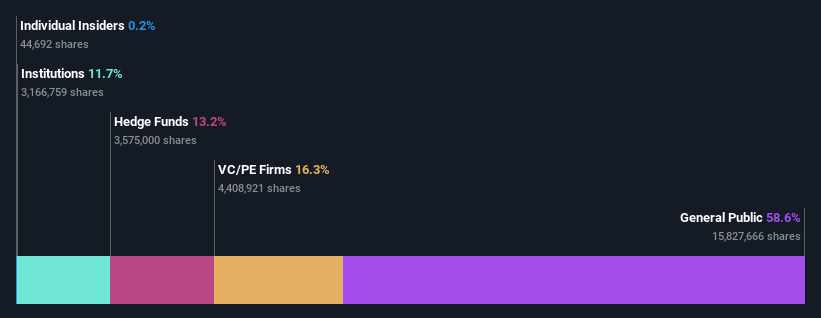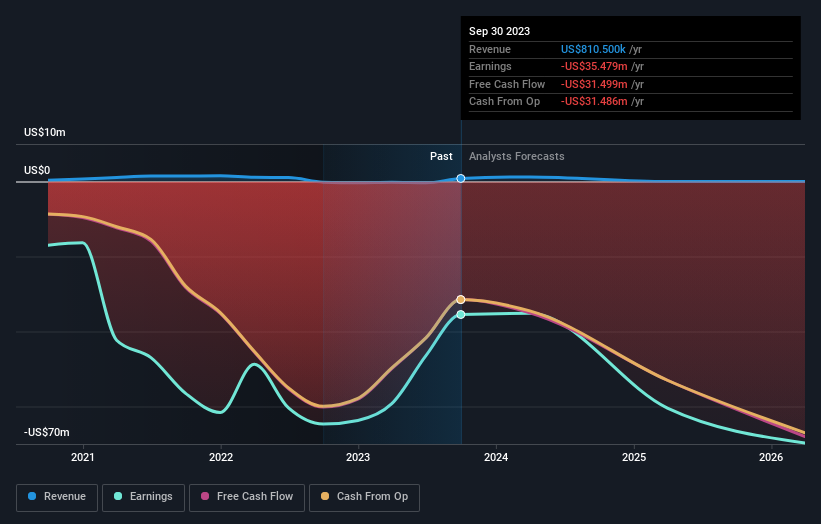Retail investors are Vistagen Therapeutics, Inc.'s (NASDAQ:VTGN) biggest owners and were rewarded after market cap rose by US$12m last week
Key Insights
Significant control over Vistagen Therapeutics by retail investors implies that the general public has more power to influence management and governance-related decisions
The top 25 shareholders own 41% of the company
Every investor in Vistagen Therapeutics, Inc. (NASDAQ:VTGN) should be aware of the most powerful shareholder groups. We can see that retail investors own the lion's share in the company with 59% ownership. In other words, the group stands to gain the most (or lose the most) from their investment into the company.
As a result, retail investors were the biggest beneficiaries of last week’s 14% gain.
In the chart below, we zoom in on the different ownership groups of Vistagen Therapeutics.
See our latest analysis for Vistagen Therapeutics
What Does The Institutional Ownership Tell Us About Vistagen Therapeutics?
Institutional investors commonly compare their own returns to the returns of a commonly followed index. So they generally do consider buying larger companies that are included in the relevant benchmark index.
We can see that Vistagen Therapeutics does have institutional investors; and they hold a good portion of the company's stock. This suggests some credibility amongst professional investors. But we can't rely on that fact alone since institutions make bad investments sometimes, just like everyone does. It is not uncommon to see a big share price drop if two large institutional investors try to sell out of a stock at the same time. So it is worth checking the past earnings trajectory of Vistagen Therapeutics, (below). Of course, keep in mind that there are other factors to consider, too.
It would appear that 13% of Vistagen Therapeutics shares are controlled by hedge funds. That catches my attention because hedge funds sometimes try to influence management, or bring about changes that will create near term value for shareholders. Our data shows that TCG Crossover Management, LLC is the largest shareholder with 9.9% of shares outstanding. In comparison, the second and third largest shareholders hold about 7.4% and 6.4% of the stock.
On studying our ownership data, we found that 25 of the top shareholders collectively own less than 50% of the share register, implying that no single individual has a majority interest.
While it makes sense to study institutional ownership data for a company, it also makes sense to study analyst sentiments to know which way the wind is blowing. There is some analyst coverage of the stock, but it could still become more well known, with time.
Insider Ownership Of Vistagen Therapeutics
The definition of an insider can differ slightly between different countries, but members of the board of directors always count. Management ultimately answers to the board. However, it is not uncommon for managers to be executive board members, especially if they are a founder or the CEO.
Most consider insider ownership a positive because it can indicate the board is well aligned with other shareholders. However, on some occasions too much power is concentrated within this group.
Our most recent data indicates that insiders own less than 1% of Vistagen Therapeutics, Inc.. It appears that the board holds about US$168k worth of stock. This compares to a market capitalization of US$102m. We generally like to see a board more invested. However it might be worth checking if those insiders have been buying.
General Public Ownership
The general public -- including retail investors -- own 59% of Vistagen Therapeutics. With this amount of ownership, retail investors can collectively play a role in decisions that affect shareholder returns, such as dividend policies and the appointment of directors. They can also exercise the power to vote on acquisitions or mergers that may not improve profitability.
Private Equity Ownership
With an ownership of 16%, private equity firms are in a position to play a role in shaping corporate strategy with a focus on value creation. Some investors might be encouraged by this, since private equity are sometimes able to encourage strategies that help the market see the value in the company. Alternatively, those holders might be exiting the investment after taking it public.
Next Steps:
It's always worth thinking about the different groups who own shares in a company. But to understand Vistagen Therapeutics better, we need to consider many other factors. Take risks for example - Vistagen Therapeutics has 5 warning signs (and 3 which shouldn't be ignored) we think you should know about.
If you are like me, you may want to think about whether this company will grow or shrink. Luckily, you can check this free report showing analyst forecasts for its future.
NB: Figures in this article are calculated using data from the last twelve months, which refer to the 12-month period ending on the last date of the month the financial statement is dated. This may not be consistent with full year annual report figures.
Have feedback on this article? Concerned about the content? Get in touch with us directly. Alternatively, email editorial-team (at) simplywallst.com.
This article by Simply Wall St is general in nature. We provide commentary based on historical data and analyst forecasts only using an unbiased methodology and our articles are not intended to be financial advice. It does not constitute a recommendation to buy or sell any stock, and does not take account of your objectives, or your financial situation. We aim to bring you long-term focused analysis driven by fundamental data. Note that our analysis may not factor in the latest price-sensitive company announcements or qualitative material. Simply Wall St has no position in any stocks mentioned.


